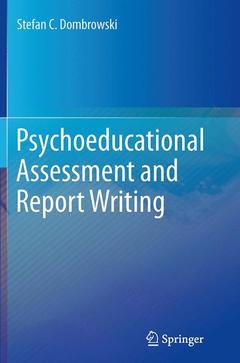Description
Psychoeducational Assessment and Report Writing, Softcover reprint of the original 1st ed. 2015
Author: Dombrowski Stefan C.
Language: English
Subjects for Psychoeducational Assessment and Report Writing:
Keywords
Autism spectrum disorders and assessment; Clinical assessment of children and adolescents; Emotional disturbance and psychoeducational assessment; English as a second language and psychoeducational assessment; Evaluation reports and students; Hearing impairment and psychoeducational assessment; IDEA classifications and psychoeducational assessments; Independent educational evaluation; Learning disabilities and psychological reporting; Multiple disabilities and psychological reporting; Oral feedback and ps
Approximative price 60.12 €
In Print (Delivery period: 15 days).
Add to cartSupport: Print on demand
Description
/li>Contents
/li>Biography
/li>Comment
/li>
Key areas of coverage include:
? Assessment basics: the testing environment and protocols, interviewing, and observation.
? Report writing section by section, from reason for referral to summary and recommendations.
? Guidelines for oral reporting, with case examples.
? Special issues in psychoeducational assessment and report writing.
? Sample psychoeducational reports using this framework.
Psychoeducational Assessment and Report Writing is an essential text for graduate students, researchers, professors, and professionals in child and school psychology; assessment, testing, and evaluation; social work; and psychological methods/evaluation.
Focuses on psychoeducational assessment and report writing for kindergarten through grade 12
Details report components, including referral, background, assessment methods, and how to build a case for IDEA classification categories
Details how to provide oral feedback to parents and teachers following report completion




